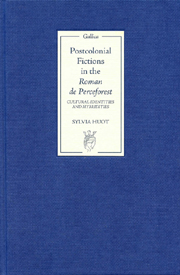Book contents
- Frontmatter
- Contents
- Acknowledgements
- Introduction
- PART I Founding Myths: Nature, Culture, and the Production of a British Kingdom
- PART II Heteronormative Sexuality and the Mission Civilisatrice
- PART III Greeks, Trojans, and the Construction of British History
- 7 Lest We Forget: The Trojan War as a Cultural Matrix
- 8 Lest We Remember: The Artifice of History
- Conclusion
- Glossary of Proper Names in Perceforest
- Bibliography
- Index
8 - Lest We Remember: The Artifice of History
from PART III - Greeks, Trojans, and the Construction of British History
Published online by Cambridge University Press: 05 February 2013
- Frontmatter
- Contents
- Acknowledgements
- Introduction
- PART I Founding Myths: Nature, Culture, and the Production of a British Kingdom
- PART II Heteronormative Sexuality and the Mission Civilisatrice
- PART III Greeks, Trojans, and the Construction of British History
- 7 Lest We Forget: The Trojan War as a Cultural Matrix
- 8 Lest We Remember: The Artifice of History
- Conclusion
- Glossary of Proper Names in Perceforest
- Bibliography
- Index
Summary
‘Historical reality … is only available through textual sources and cannot be recovered independently of the processes of construction and manipulation which those involve.’ Thus Bart Moore-Gilbert sums up one side of Spivak's theoretical position and of Subaltern Studies in general. At the same time, Moore-Gilbert also acknowledges a counter strain in the work of Spivak and other postcolonial theorists, one that posits an absolute ‘real’ independent of such mediation: what is sometimes called ‘the “real history” of colonialism’ (ibid.). The problem of historical truth – of authentic, lived experience and its distortion or concealment beneath competing discursive layers of oral, textual, and visual commemoration – is central to Perceforest. And it is in the second half of the romance, with the restoration of the kingdom and its subsequent, definitive defeat, that these issues are most explicitly brought to the fore.
In the aftermath of the Roman invasion, the restored Greco-British kingdom stands at a point in history notably different from that of its original foundation under Alexander. Rather than positioning themselves as an originary moment that will become a glorious past for future generations to marvel at, as did Perceforest and his contemporaries, the knights of the restoration are positioned in a middle ground. And as such they seek to subdue the past, preserving it as history in the lais sung by the old minstrel Ponchonnet and in the chronicle discovered amid the ruins of the Franc Palais, but banishing it from active intrusion into the present. Unlike Perceforest and Gadifer, Gallafur and his companions have a British past, and they have to negotiate their position as a bridge between that past and the future that must be produced.
- Type
- Chapter
- Information
- Postcolonial Fictions in the 'Roman de Perceforest'Cultural Identities and Hybridities, pp. 183 - 206Publisher: Boydell & BrewerPrint publication year: 2007



